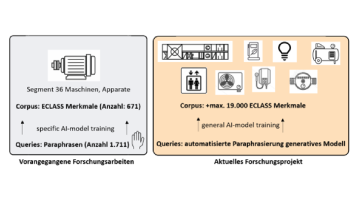Semantic-Search ECLASS-features

Standardized product master data enables interoperable interaction in Industry 4.0 value creation networks.
In this context, ECLASS has established itself as a standard. However, mapping existing, e.g. manufacturer-specific catalogs to the ECLASS standard involves a great deal of manual effort. Suitable features must be identified and mapped in the ECLASS standard for the features of the catalogs. The use of intelligent algorithms based on artificial intelligence can improve the search for product features in semantic standards. This makes it easier to get started with and use a standard such as ECLASS. For example, it is possible for a manufacturer to (partially) automatically translate product descriptions using intelligent search algorithms. The aim of this project is to develop a language model that is optimized for searching ECLASS features. This language model uses the name and description of a proprietary feature and compares these with the names and descriptions of ECLASS features. Pre-trained language models with a general understanding of the language can be used as the basis for the development of the language model. These models are then fine-tuned to the ECLASS standard. During fine-tuning, a language model independently learns to map unknown features to the ECLASS standard. The basis for fine-tuning is a data set consisting of pairs of unknown features and corresponding ECLASS features. The concrete result of the project is the provision of the developed language models and the fine-tuning data set. In addition, the models are integrated into a prototype demonstration of the semantic search algorithm. The execution process (first data set creation, then fine tuning) is defined in advance, but it is not possible to predict what quality this process will achieve. The model quality achieved is analyzed at the end so that conclusions can be drawn for later projects and adjustments can be made to the models. Proprietary features from different manufacturers (Neoception, Pepper&Fuchs, Weidmüller, Phoenix Contact), which are already mapped to the ECLASS standard, can be used for the evaluation. This allows the model to be tested on real data and application scenarios. The project process is also described in the schedule below.
Project partner: ECLASS e.V.
Funding provider: ECLASS e.V.
Duration: 01.07.2023 - 31.12.2023

